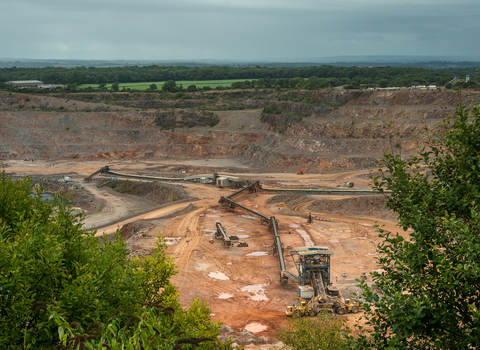Quarrying and the extraction of non-energy minerals/aggregates
Somerset Wildlife Trust individually, and collectively part of the national Wildlife Trust movement, have a long history of positive engagement with the quarrying sector. Indeed some of our best nature reserves are exhausted quarry workings. We recognise that quarrying for non-energy mineral/aggregate extraction can be extremely damaging to the natural environment, but with the right location, planning, design and implementation, this can be avoided and a net benefit for nature can be achieved. Therefore we engage with the sector to encourage best practice, recognise good examples of where sites through their operation and restoration contribute to nature’s recovery and to challenge the sector to go further.
Put into broader context...
We are facing two inextricably linked crises – the climate emergency and the alarming decline of nature. We cannot solve one without tackling the other. Somerset Wildlife Trust wants to see at least 30% of the UK's land and seas protected and connected for nature by 2030 - creating a wilder future, where nature is in recovery, and where everyone, everywhere, has access to high value natural green space.
Quarrying for non-energy mineral/aggregate extraction can negatively impact wildlife through loss and damage to habitat; disturbance from noise, dust and vibration; air and water pollution; and changes to hydrology and hydrogeology, which can affect groundwater quality and quantity.
With careful planning of location and design, we believe quarrying can avoid or have minimal impact on the natural world, and actually deliver potential opportunities for wildlife and the wider environment. This can be achieved through the creation and improvement of habitats in areas that are currently of limited value for wildlife. Where appropriate, we will work with extraction industries to support this.
Our position on specific proposals will be determined by following a detailed assessment of the merits of each case and the impact on the local environment. We would:
Expect all proposals to meet the highest planning standards...
...and follow the avoid, minimise, compensate, and net gain hierarchy to ensure that significant natural environment impacts are avoided.
Expect a full Environmental Impact Assessment (EIA) for all proposals.
This should cover the lifetime of the project and be informed by site-based surveys, local data, and ecological expertise.
Evaluate and consider any proposal in the context of:
- the value of the habitats, species and natural processes on which it will have direct or indirect impacts;
- local cumulative impacts to nature;
- impacts on climate change
- whether alternative, less damaging locations have been considered
- whether it provides appropriate and full mitigation and compensation for all likely impacts.
- whether it makes a positive contribution to nature and the resilience and ability of wildlife and people to adapt to climate change, supporting, not undermining a Nature Recovery Network.
Not support proposals that result in a net loss for biodiversity and that cause direct or indirect damage to...
...areas of importance for wildlife at the international, national, sub-national or local level; priority habitats and species; habitat identified for nature’s recovery as part of the local Nature Recovery Network Strategy; or proposals that compromise national or local objectives for these habitats or species, ecological connectivity or function.
Expect all developments to contribute to nature’s recovery by providing a net gain for biodiversity...
...and once exhausted restored to high quality habitat, informed by the Local Nature Recovery Strategy. A condition of any planning permission should be that adequate funds are set aside to achieve this and its management in perpetuity.

